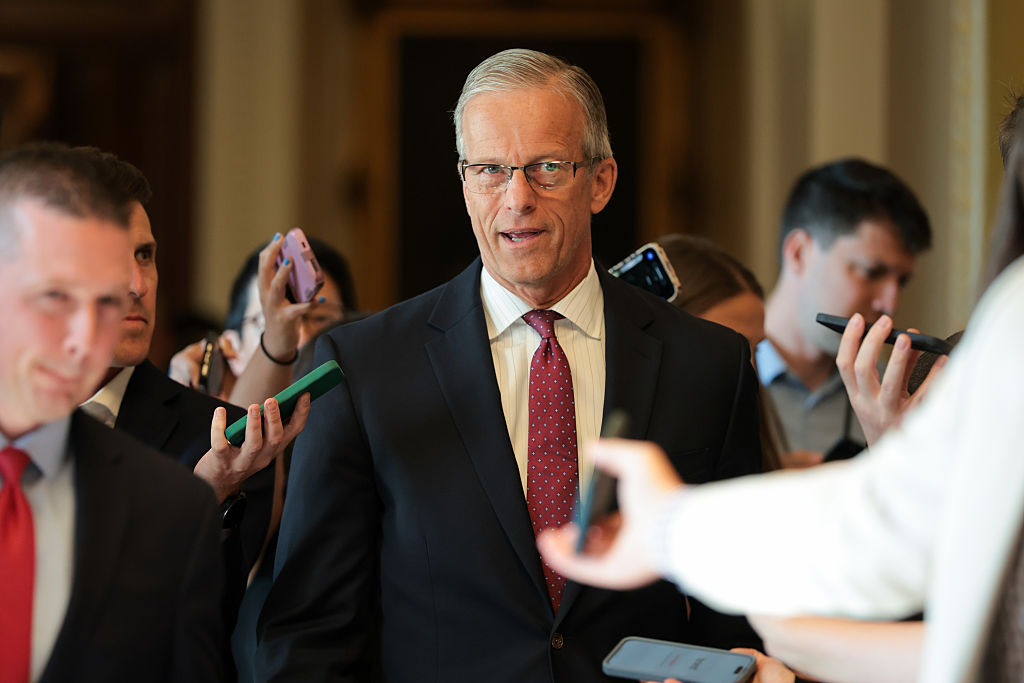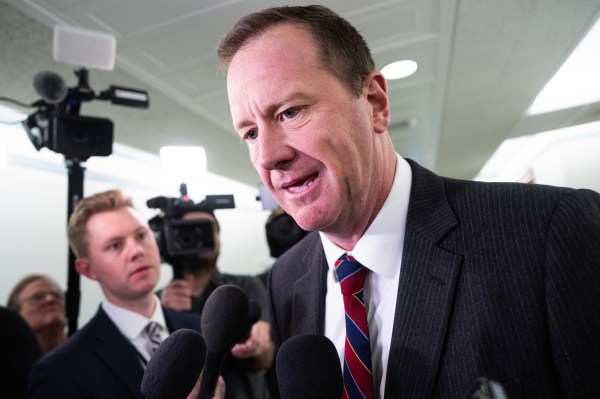You’re reading the free version of The Morning Dispatch. Consider joining as a paid member to get full access to our news, analysis, community comments, and live events.
Happy Friday! We’re hiring! As The Dispatch continues to grow, we’re looking to bring on another editor to work on this newsletter. If you’re interested—or know someone who might be—check out our careers page.
Quick Hits: Today’s Top Stories
- The centrifuges at Iran’s underground Fordow nuclear site are “no longer operational” following U.S. strikes last week, International Atomic Energy Agency head Rafael Grossi told Radio France Internationale on Thursday. United Nations inspectors have been unable to access the uranium enrichment facility, he noted, saying that his agency drew its conclusions based on the types of munitions used in the U.S. attack and the delicacy of the machinery at Fordow. Grossi also appeared to contest President Donald Trump’s assertion that the Iranian nuclear program had been “obliterated,” characterizing the military operation targeting Natanz, Isfahan, and Fordow as having resulted in “enormous damage.” Grossi’s comments came amid apparently conflicting assessments from the Central Intelligence Agency and the Defense Intelligence Agency over the extent to which Iran’s nuclear program has been impeded.
- The Supreme Court on Thursday ruled that Planned Parenthood and one of its Medicaid patients lacked the legal standing to sue South Carolina over a statewide policy preventing Planned Parenthood, which provides abortion services, from receiving Medicaid funding for non-abortion health care. In a 6-3 ruling, the court reversed a lower court’s decision allowing Planned Parenthood to seek to reinstate its clinics as qualified providers under the Medicaid Act. Writing for the majority, Justice Neil Gorsuch referenced abortion only in passing, emphasizing that private suits can only enforce federal statutes in exceedingly rare cases, which require the approval of “elected officials” and not “unelected judges.”
- The Senate parliamentarian said Thursday that provisions of a GOP-backed reconciliation megabill must be rewritten or dropped from the bill, dealing a blow to Republican leadership’s efforts to get the bill to President Donald Trump’s desk by July 4. The ruling affects several of the bill’s largest proposed budget cuts, including Republicans’ plan to limit state provider taxes, which raise money for federal Medicaid programs. Republicans are using budget reconciliation, a process that allows them to bypass the filibuster and capitalize on their 53-47 Senate majority, to pass the bill. But according to the parliamentarian, many provisions in the legislation do not comply with the Byrd Rule, which requires reconciliation bills to focus solely on budgetary matters.
- New York City Mayor Eric Adams formally launched his reelection campaign on Thursday, two days after state Assemblyman Zohran Mamdani’s victory over former Gov. Andrew Cuomo in the city’s Democratic primary. Speaking outside City Hall, the controversy-saddled incumbent affirmed his plans to run as an independent candidate in the November general election. “This is not a city where you use idealism to state you’re giving everything to everyone for free,” he said in apparent reference to Mamdani’s socialist platform. “There’s no dignity in someone giving you everything for free.”
- The U.S. and China have worked out details of a trade agreement on rare earth exports and the easing of some tech restrictions, according to a statement released by China’s Ministry of Commerce today. The deal follows trade talks in Geneva last month that resulted in the postponement of large tariff hikes that threatened trade between the two countries. President Trump said Thursday at the White House that “we just signed with China yesterday,” and an administration official later clarified that the U.S. and China came to “an additional understanding of a framework to implement the Geneva agreement.”
- Illinois Gov. J.B. Pritzker on Thursday announced plans to run for reelection in 2026. The Democratic governor will seek a third term despite ongoing speculation that he may run for president in 2028, though he has not yet committed to serving his full four-year term if reelected. In a video announcing his candidacy, Pritzker highlighted the effects of President Trump’s tariffs on the state’s agricultural industry and small businesses. “I’m not about to stand by and let him tear down all we’re building in Illinois,” he said.
The Reconciliation Situation

If in high school you ever rushed to finish a group project right before the due date, you probably have some sense of what Senate Republicans are going through this week. Time is ticking down to the July 4 deadline President Donald Trump imposed on the congressional GOP to get the “one big, beautiful bill” to his desk.
It contains the president’s key legislative priorities for his second term, including funding for border security and national defense, a permanent extension of the 2017 tax cuts, and a host of spending cuts that leaders have hoped will total $1.5 trillion. Beyond bringing at least 50 members of their conference to consensus on the package, Senate Republicans must also navigate difficult procedural dynamics in the budget reconciliation process, which allows them to bypass their chamber’s 60-vote threshold to overcome a filibuster and pass a party-line bill.
That process has a catch—legislation must comply with the Byrd Rule, which was incorporated into the Congressional Budget Act in 1990 as a way to keep out measures that don’t pertain to budgetary matters. There are three key criteria that the bill’s provisions must meet: They must be related to fiscal policy, they must not increase the budget deficit beyond 10 years, and they must not touch Social Security. The person who ultimately decides what can and cannot go into a budget reconciliation bill is the Senate’s rulekeeper on staff, the parliamentarian. With this particular bill, major changes during the “Byrd bath,” in which the Senate scrubs the legislation to see if it meets the reconciliation criteria, could upset the delicate balance between cutting spending and cutting taxes, resulting in a very different bill than the GOP had originally planned. And the Byrd bath is one of many variables with which Republican senators must contend as they try to push the bill through their chamber.
The parliamentarian has already struck down several provisions of the bill. The so-called “Byrd droppings” have included one provision to sell public lands and another that would have defunded the Consumer Financial Protection Bureau, meaning Republicans will need to either rewrite those sections of the megabill or abandon them altogether.
But on Thursday, the parliamentarian, Elizabeth MacDonough, stepped into an issue that has been a flashpoint in the Republican Senate conference as it crafts the bill and tries to rush it to Trump’s desk. A major avenue the GOP is using to obtain its targeted cost-cutting is changes to Medicaid. One of the Republicans’ targets is the “provider tax loophole.” States will often tax medical providers, such as hospitals and nursing homes, to fund their Medicaid programs. They will then return that money to the facilities, count it as a Medicaid expense, and receive a portion of it back from the federal government.
Many Republicans have described this system as a costly gimmick. For certain Republican senators, though, the money is a key resource that keeps hospitals in their states afloat. That’s why a provision that incentivizes states to lower their provider taxes alarmed some Republicans, including Sens. Thom Tillis of North Carolina, Susan Collins of Maine, and Josh Hawley of Missouri. In response to their concerns, the conference floated proposals for a rural hospital fund that would support facilities that might be affected by the provider tax provision.
Senators were considering their options when they woke up Thursday morning to learn that the parliamentarian had struck down the provider tax framework. Hawley said the ruling gave the Senate “a chance to get it right.”
“This is a chance for the Senate to fix this problem—that they created—and not defund rural hospitals,” he told TMD.
In the wake of the parliamentarian’s ruling, Republicans are proposing two possible avenues. One is to fire MacDonough, a move Sens. Tommy Tuberville of Alabama and Roger Marshall of Kansas have endorsed.
“She’s been here since 2012. She has a lot of power,” Marshall told reporters. “I don’t think anyone should stay here that long and have power where she doesn’t answer to anybody, so I think we should have a term limit on how many years a parliamentarian can be there. There’s this old saying that absolute power corrupts absolutely. I think it just goes to people’s head. I think that her rulings … would look like, politically, that she’s leaning to the left.”
But other GOP senators are not so keen to dismiss MacDonough, who was appointed by the late Democratic Sen. Harry Reid in 2012 when he was majority leader—and retained by Democrats after she blocked a provision of theirs in a 2021 reconciliation bill that would have increased the federal minimum wage to $15. Earlier this month, Senate Majority Leader John Thune threw cold water on overruling the parliamentarian, and he pushed back against firing her on Thursday. “That would not be a good outcome for getting a bill done,” he said.
Instead, Republicans will try to rewrite the section dealing with the provider tax. “We’re looking for how to achieve the same cuts, regardless of the ruling of the parliamentarian,” Sen. John Cornyn of Texas, who sits on the Finance Committee that has jurisdiction over that part of the bill, told reporters. He said the GOP had “a number of options” and did not express interest in dismissing or overruling MacDonough. “I think we’re doing the usual process and trying to figure out how to achieve the same goal without having to go there,” he added.
It’s unclear how Republicans plan to rework the bill, but whatever they do, it will need to pass muster with the parliamentarian and unite moderates and spending hawks in both the Senate and the House of Representatives, which will have to approve any changes the upper chamber makes.
One of those changes is the level of the cap on the state and local tax (SALT) deduction, a provision that matters to people living in mostly blue states with high property and income taxes. A collection of House Republicans, primarily from New York, successfully convinced Speaker Mike Johnson to raise the cap on the SALT deduction from the current $10,000 to $40,000 in the version of the bill the House passed last month. But the Senate version leaves the $10,000 cap in place, which hasn’t pleased the SALT caucus in the House. Republican Sen. Markwayne Mullin of Oklahoma, who often acts as an unofficial liaison between the two chambers, has attempted—unsuccessfully thus far—to negotiate with the group. “We’re still working through it. Every day we’re getting closer. We’re just letting everybody talk and figure out where we’re going to have a landing spot at,” he told reporters Thursday.
But earlier in the week, Rep. Mike Lawler of New York told TMD he was not willing to budge from the SALT deal he and his cohort negotiated. “Markwayne’s a good guy, and he’s a friend, but the bottom line here is the deal that we negotiated in the House with the House leadership, with the White House, that’s the deal,” he told reporters. “So that’s what ultimately is going to be in the final passage.”
With July 4 one week away, Republicans in the Senate have a host of provisions to hammer out, and Trump is waiting to see the results of their work.
Today’s Must-Read

When Women Are Radicalized
Toeing the Company Line


The Hidden Cost of Intelligence Leaks

How Sergio Gor Cashed in With Trumpworld

Does ‘Socialism’ Still Mean Anything?

Tax Bill Highlights the Collapse of GOP Policymaking

Supreme Court Fails to Sway Democrats on Gender Treatment Laws

Iraq Syndrome

Ruling Against Planned Parenthood
Worth Your Time
- In the aftermath of self-declared socialist Zohran Mamdani’s defeat of former Gov. Andrew Cuomo in the New York City mayoral race’s Democratic primary on Tuesday, Jesse Arm—writing for City Journal—looked at how three people could shape the general election’s outcome come November. “First is Donald Trump. The president grew disgusted by New York’s politics and has spent the past decade relishing his exile in Mar-a-Lago and the White House. But New York is still his hometown, and if he wants to stop the candidate he has described as ‘a 100% Communist Lunatic,’ he may have the muscle to do it. Last November, Trump won 30 percent of the city’s vote—more than any Republican mayoral candidate has earned since Ronald Reagan. He could endorse [Curtis] Sliwa. Or he could quietly offer Sliwa a creative federal post and clear the path for [New York Mayor Eric] Adams. … The second player is Mamdani. He’s a serious political operator and an ideological hardliner, but not a fool. He surely knows that if he wants to become the Democratic Party’s most important new national figure, he may need to soften some edges,” Arm wrote. “The city’s political and philanthropic elites are the third key player. They can’t undo what’s happened, but they can still shape what comes next. If the goal is stopping Mamdani, someone—Adams, [NYPD Commissioner Jessica] Tisch, whoever—must consolidate the majority of voters for whom Mamdani may yet prove too far-left.”
- Can starting think tanks help the Democratic Party regain its footing after an electoral loss? It depends, Tevi Troy wrote in Politico. “Shortly into Ronald Reagan’s presidency, British Prime Minister Margaret Thatcher gave a speech at the Heritage Foundation in which she described America’s foreign policy before Reagan as ‘lose a country, gain a restaurant.’ Her audience, recognizing the pattern of foreign policy defeats and new D.C. restaurants featuring Vietnamese, Iranian and Afghani cuisines, laughed uproariously. Her insight might just as well describe another decades-long D.C. cycle: lose an election, gain a think tank,” he wrote. “The major parties have a habit of responding to electoral defeat by creating such institutions to generate new ideas and produce talent for the inevitable return to power — witness the creation of a new Democratic think tank called Searchlight. Think tank history tells us that this latest iteration can play an important role in the Democratic Party’s climb back to relevance. But the institution only works if a party is aiming for a reboot or a new direction. And it’s not clear Democrats are ready or willing to do that.”
Presented Without Comment
CBS News: Iran’s Ayatollah [Ali] Khamenei Issues Claims of Victory Over Israel, ‘A Big Slap in the Face’ to the U.S.
In a recorded video address to his nation — his first public remarks since the U.S.-brokered ceasefire with Israel took effect on Tuesday — Khamenei … [suggested] a “large number of military and other targets” in Israel had been targeted by Iran’s missiles.
They may have been targeted, but in reality, Iran’s 12 days of missile launches saw relatively few rockets evade Israel’s air defenses. A total of 28 people were killed, and none of them have been identified as government officials, but rather civilians killed when missiles struck apartment buildings and cities.
…
Khamenei also claimed Iran had given “the U.S. a big slap in the face” by attacking the Al-Udeid Air Base in Qatar, which is home to thousands of American forces. But none of the roughly dozen missiles Iran fired at the sprawling base hit it. They were intercepted, despite the ayatollah’s assertion of “lots of damage” to the site.
Also Presented Without Comment
The Guardian: Mexico’s President Threatens To Sue Over SpaceX Debris From Rocket Explosions
In the Zeitgeist
Yesterday in Paris, Kenyan Olympic gold medalist Faith Kipyegon narrowly fell short in her attempt to become the first woman to run a mile in under 4 minutes, finishing in 4:06.42 and beating her own previous world record.
Let Us Know
Do you think it’s appropriate for a U.S. president to get involved in a city-wide election?












Please note that we at The Dispatch hold ourselves, our work, and our commenters to a higher standard than other places on the internet. We welcome comments that foster genuine debate or discussion—including comments critical of us or our work—but responses that include ad hominem attacks on fellow Dispatch members or are intended to stoke fear and anger may be moderated.
With your membership, you only have the ability to comment on The Morning Dispatch articles. Consider upgrading to join the conversation everywhere.